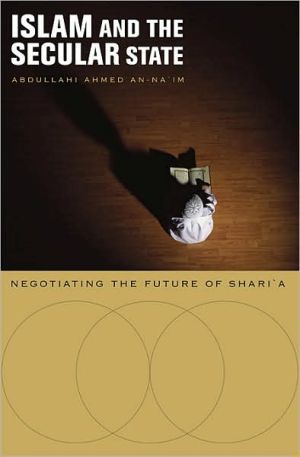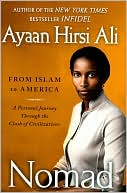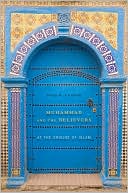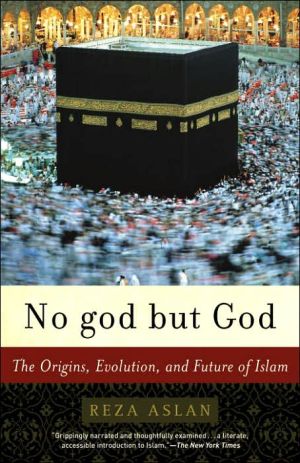Islam and the Secular State: Negotiating the Future of Shari'a
What should be the place of Shari'a-Islamic religious law-in predominantly Muslim societies of the world? In this ambitious and topical book, a Muslim scholar and human rights activist envisions a positive and sustainable role for Shari'a, based on a profound rethinking of the relationship between religion and the secular state in all societies.
Search in google:
What should be the place of Shari‘a—Islamic religious law—in predominantly Muslim societies of the world? In this ambitious and topical book, a Muslim scholar and human rights activist envisions a positive and sustainable role for Shari‘a, based on a profound rethinking of the relationship between religion and the secular state in all societies. An-Na‘im argues that the coercive enforcement of Shari‘a by the state betrays the Qur’an’s insistence on voluntary acceptance of Islam. Just as the state should be secure from the misuse of religious authority, Shari‘a should be freed from the control of the state. State policies or legislation must be based on civic reasons accessible to citizens of all religions. Showing that throughout the history of Islam, Islam and the state have normally been separate, An-Na‘im maintains that ideas of human rights and citizenship are more consistent with Islamic principles than with claims of a supposedly Islamic state to enforce Shari‘a. In fact, he suggests, the very idea of an “Islamic state” is based on European ideas of state and law, and not Shari‘a or the Islamic tradition.Bold, pragmatic, and deeply rooted in Islamic history and theology, Islam and the Secular State offers a workable future for the place of Shari‘a in Muslim societies. The Washington Post - Geneive Abdo An-Na'im's experience in his native Sudan and in the United States has bred the practical assumption that an Islamic state will lead only to tyranny, and that Muslims need a secular state in which to live their faith by their own free choice; for him, this is "the only valid and legitimate way of being a Muslim."
Preface vii1 Introduction: Why Muslims Need a Secular State 12 Islam, the State, and Politics in Historical Perspective 453 Constitutionalism, Human Rights, and Citizenship 844 India: State Secularism and Communal Violence 1405 Turkey: Contradictions of Authoritarian Secularism 1826 Indonesia: Realities of Diversity and Prospects of Pluralism 2237 Conclusion: Negotiating the Future of Sharica 267References 295Index 311
\ Geneive AbdoAn-Na'im's experience in his native Sudan and in the United States has bred the practical assumption that an Islamic state will lead only to tyranny, and that Muslims need a secular state in which to live their faith by their own free choice; for him, this is "the only valid and legitimate way of being a Muslim."\ —The Washington Post\ \ \ \ \ Library JournalMuslim scholar (Emory Univ.) and human rights activist An-Na'im has written extensively on law and human rights in the Islamic world (e.g., Toward an Islamic Reformation: Civil Liberties, Human Rights, and International Law). Here, he turns to the subject of the state's coercive enforcement of Sharia-Koran-based Islamic law-in predominantly Muslim societies, arguing that its promulgation of Sharia is contrary to the Koranic insistence on the voluntary acceptance of Islam and the freely chosen adherence to its commandments. He argues for religion to be separate from the state, positing that the secular (i.e., neutral) state is the best instrument to safeguard the rights of Muslims and others. And he demonstrates that it has always been impossible to have an "Islamic state" because the Sharia itself was created and codified subject to imperfect human interpretation. Nonetheless, he acknowledges that significant portions of the Muslim world currently have difficulty separating Sharia as a religious duty from Sharia as a state-imposed code. An-Nai'm's thoughtful argument seems directed toward a well-educated Muslim readership. Highly recommended for university and large public libraries and Islamic collections (including mosque libraries).\ —William P. Collins\ \ \ \ Globe and MailAn-Na'im lays out with candor and elegance the need for the state to be secular for all citizens, and explores Muslim polities in Indonesia, India and Turkey.\ — Emran Qureshi\ \ \ \ \ \ New York Review of BooksMak[es] a powerful theological case for abandoning the very notion of an Islamic state. [An-Na'im] argues that the claims of these so-called states to enforce the Sharia repudiate the fundamental right of religious choice implicit in a Koranic verse that says there can be "no compulsion in religion."\ — Malise Ruthven\ \ \ \ \ \ ssrc.org/blogs/immanent_frameFew books in Islamic studies have been as eagerly awaited or intensely debated prior to publication as Abdullahi Ahmed An-Na‘im’s Islam and the Secular State: Negotiating the Future of Shari‘a...[This book] testifies to the richness of [Ahmed An-Na‘im’s] life work, and to the courage of an author who deserves to be recognized as one of the most important religious thinkers of our age.\ — Robert Hefner\ \ \ \ \ \ Times Higher Education Supplement[A] controversial and topical book...Although not all Muslim scholars will fully agree with An-Na'im's proposals regarding the institutional separation of Islam and the state, his thoughts are a step forward towards a healthy negotiation for the future of Sharia.\ — Helen Haste\ \ \ \ \ \ Washington Post Book WorldAn-Na'im is an independent-minded intellectual who has raised sensitive issues (such as his belief that interpretations of sharia have led to discrimination against non-Muslim minorities in the Arab world) that many Muslims and their advocates would prefer to keep out of public debate...The crux of An-Na'im's Islam and the Secular State is that Muslims should be allowed to practice their faith as they see fit and should comply with sharia, but voluntarily. The call from Islamists to impose sharia with the full power of the state will only lead to totalitarianism, he argues. To bolster his claim, he notes that the Koran never mentions the idea of a state and does not prescribe a particular form of government.\ — Geneive Abdo\ \ \








